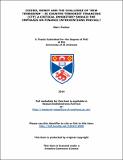Files in this item
Cicero, money and the challenge of 'new terrorism' : is counter terrorist financing (CTF) a critical inhibitor? Should the emphasis on finance interventions prevail?
Item metadata
| dc.contributor.advisor | Taylor, Max | |
| dc.contributor.author | Parker, Marc | |
| dc.coverage.spatial | 227 p. | en_US |
| dc.date.accessioned | 2014-06-19T15:50:49Z | |
| dc.date.available | 2014-06-19T15:50:49Z | |
| dc.date.issued | 2014 | |
| dc.identifier | uk.bl.ethos.605816 | en_US |
| dc.identifier.uri | https://hdl.handle.net/10023/4900 | |
| dc.description.abstract | Much of the first generation literature on counter terrorist financing made sweeping generalisations and observations regarding these interventions based on relatively limited case study data. Given that the UK approach to counter terrorism clearly attests to the symbiosis between terrorism and money, this thesis evaluates the contemporary relevance of Cicero's aphorism that “the sinews of war are infinite money.” Drawing on a series of discussions and formal interviews with CTF practitioners into several of the most recent high profile terror attacks in the United Kingdom, it confirms a notable shift in terrorist financing methodology in recent years and underscores the trend towards increasing operational independence and financial autonomy. It thus considers the continuing centrality of money in the terrorism equation and has been framed specifically to examine the financing challenges posed by domestic terror cells in the UK, given the trend towards low cost terrorism with its emphasis on self sufficiency and the emergence of more discreet and ‘criminally sterile' funding methodologies. This thesis is primarily concerned with reviewing the efficacy of the UK counter terrorism-financing (CTF) model as perceived by practitioners, both in policy terms and in the context of operational outcomes. The increasing emphasis on new funding methodologies and the ensuing lack of visibility and opportunities for interdiction at the conspiracy phase of terrorist plots, further highlights the operational challenges posed for practitioners in confronting these ‘new’ threats. As such, this research encourages several new perspectives, including a review of UK corporate knowledge on previous CTF interventions and consideration of military ‘threat finance’ practice to deliver greater operational impact. In particular, it advocates a new focus on micro CTF interventions to address changes in the ‘economy of terror’. Finally, this thesis strongly attests to the continued relevance of finance or more specifically, the 'financial footprint' to inform and provide intelligence insight for counter terrorism responses generally. In doing so, it also considers the impact on privacy from increasingly intrusive financial and digital data collection and the trade-offs that inevitably emerge when liberty and security collide. | en_US |
| dc.language.iso | en | en_US |
| dc.publisher | University of St Andrews | |
| dc.rights | Creative Commons Attribution-NonCommercial-NoDerivatives 4.0 International | |
| dc.rights.uri | http://creativecommons.org/licenses/by-nc-nd/4.0/ | |
| dc.subject | Terrorist financing | en_US |
| dc.subject | Economy of terror | en_US |
| dc.subject | New terrorism | en_US |
| dc.subject | Liberty and security | en_US |
| dc.subject | Preemption | en_US |
| dc.subject | Financial intelligence | en_US |
| dc.subject | Data surveillance | en_US |
| dc.subject.lcc | HV6431.P286 | |
| dc.subject.lcsh | Terrorism--Finance--Prevention | en_US |
| dc.subject.lcsh | Terrorism--Prevention | en_US |
| dc.subject.lcsh | Electronic surveillance | en_US |
| dc.title | Cicero, money and the challenge of 'new terrorism' : is counter terrorist financing (CTF) a critical inhibitor? Should the emphasis on finance interventions prevail? | en_US |
| dc.type | Thesis | en_US |
| dc.type.qualificationlevel | Doctoral | en_US |
| dc.type.qualificationname | PhD Doctor of Philosophy | en_US |
| dc.publisher.institution | The University of St Andrews | en_US |
This item appears in the following Collection(s)
Except where otherwise noted within the work, this item's licence for re-use is described as Creative Commons Attribution-NonCommercial-NoDerivatives 4.0 International
Items in the St Andrews Research Repository are protected by copyright, with all rights reserved, unless otherwise indicated.


